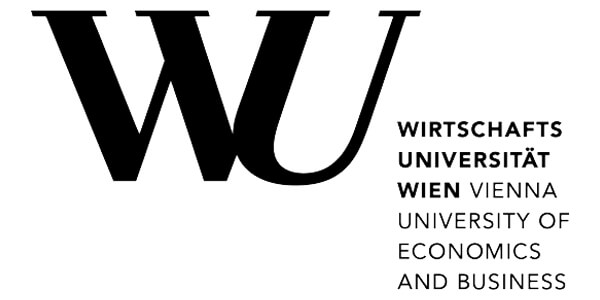Socio-Ecological Economics and Policy
- Abschluss: Master of Science (M. Sc.)
- Umfang: 4 Semesters, 120 ECTS Punkte
- Studienart: Präsenzstudium, Vollzeit
- Bildungsfeld: Wirtschaft & Management
- Unterrichtssprache: Englisch
- Website: www.wu.ac.at

The Master Socio-Ecological Economics and Policy (SEEP) is an innovative, internationally unique program that equips participants with the necessary theoretical background and factual information about the interconnected dynamics of economic and social systems and the physical environment. The program also enables participants to use appropriate analytical tools to engage in decision processes and longer-term policy on multiple spatial levels.
Rapid environmental change, population dynamics, poverty, and exclusion are interrelated processes that challenge human development. To tackle these complex issues, traditional disciplinary approaches to analysis and policy formulation are not sufficient. Instead, integrated and interdisciplinary approaches to studying the working of the human-environment system are needed. The Master Socio-Ecological Economics and Policy presents integrated approaches to development and human well-being that go beyond the usual polarization between socioeconomic development and environmental goals.
The program offers training in socioeconomic analysis and focuses on the interfaces between environmental, economic and social challenges. This interdisciplinary and internationally oriented approach is based on three major pillars: theory, methodology, and application. The theory courses include concepts from a variety of disciplines, chosen for their relevance to global challenges. The methodological courses offer an integrated introduction to qualitative and quantitative methods and thus illustrate how they are best combined in empirical analyses. Relevance for policy making and organizational practice is emphasized throughout the program.
4CONCENTRATION AREAS
Specialize in your areas of interest
The program offers four concentration areas of which you can choose two: Environment, Population, Multi-Level Policy and Social Policy.
66 %INTERNATIONAL STUDENTS
An international classroom at “home”
Our main focus lies on providing a thorough internationalization at the home university by attracting a diverse set of students from all over the world. The “international classroom at home” thus created is meant to allow students to experience foreign (academic) cultures, languages (especially English), and an international renowed faculty without having to leave the campus.
Studienaufbau & -inhalte
The Master Socio-Ecological Economics and Policy is a full-time program which takes 4 semesters. Over the course of studies students acquire theory-based knowledge, methodological skills as well as the ability to apply these in an interdisciplinary context.
Here you find further information.
Vorkenntnisse & Aufnahmeprozess
Open to a select group of students from all over the world, this program combines academic excellence with practical and political relevance. The program is aimed at students with a diverse array of backgrounds, who have a deep concern for the challenges arising from rapid environmental change, population dynamics, poverty, and exclusion, and are keen to find ways to enhance environmental sustainability and human well-being.
Here you find further information.
Karriereaussichten
The program has been designed to provide students with the necessary understanding of global sustainability issues, an ability to work in interdisciplinary teams, and sound training in socio-economic concepts and methods.
The MSc program prepares graduates for
- Employment as policy analysts, program managers, consultants, civil servants, project managers, and advisors who provide an insight into and support decision processes relating to sustainability issues by, for example, undertaking risk and uncertainty analyses in the social and environmental sectors; analyzing long-term developments relating to climate change, population development or aging in society; undertaking sustainability appraisals at company, regional or policy levels; helping design social, environmental, economic or educational policies; designing and facilitating participatory processes
- Working in international organizations, consultancies, companies, ministries, national and international NGOs, and research institutes where interdisciplinary skills and knowledge about the interactions of sustainability issues are needed
- Doctoral studies in the social sciences, in particular in economics, social policy, environmental studies and demography
Qualification profile
Graduates of the MSc (Master of Science) program Socio-Ecological Economics and Policy have the ideal qualifications for a career as socio-economists in the field of sustainability. The successful completion of the program endowed them with skills to
- gain a comprehensive understanding of issues in the field of socio-ecological transition and ensuing challenges for politics, and to analyze these issues using appropriate models and quantitative and qualitative methods
- obtain relevant information from specialist academic and practical literature and socioeconomic information systems and apply them in a critical but considered manner
- support political and management processes through appropriate designs and skills even in conflictladen situations
- work constructively in teams and participate actively in interactive problem-solving processes
The SEEP graduate is (I) equipped with the theories, methods and empirical approaches necessary for an in-depth understanding of global social, economic and environmental policy issues, (II) aware of the variety of ethical issues arising from sustainable development, (III) possesses the skills essential for interdisciplinary analysis, and (IV) is able to work in international teams in developing, designing and evaluating novel policy responses.
UNI-Profil
Wirtschaftsuniversität Wien
Welthandelsplatz 1, 1020 Wien
Telefon: 01 313 36-0 Website: www.wu.ac.at
